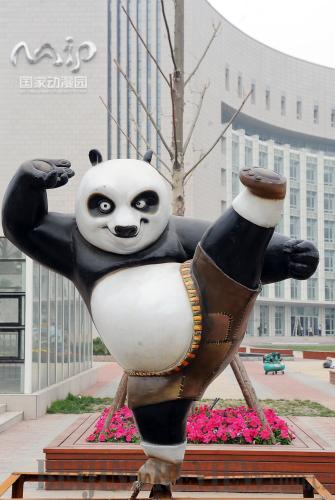 |
|
CULTURAL ICON: The statue of Kungfu Panda greets visitors at the National Animation Industry Park in Tianjin (LAN XIANGYAN) |
DreamWorks' move also upset some in China's burgeoning animation industry, who are wary of the invasion of yet another international mega-corporation, but others think domestic companies can benefit from the partnership.
Although domestic animation movies made before the 1980s, such as The Monkey King, are thought of as masterpieces by fans today, China's animation industry is still weak.
China currently has some 10,000 companies making cartoons and comics. But besides the Pleasant Goat and Big Big Wolf and the Mainland-Hong Kong co-production McDull, Kungfu Kindergarten, other animated films fared poorly at the box office.
A poll by the China Youth Daily in November 2008 showed that only 14.2 percent of the nearly 3,000 people polled liked Chinese cartoons.
By contrast, 62.4 percent of respondents said their favorite animated films were made in the United States and 45.9 percent favored films from Japan.
Xu Ke, President of Hippo Animation Design Co. Ltd. based in Shanghai called the entry of DreamWorks "catastrophic" for the domestic animation industry.
"China's animation industry lagged far behind Hollywood for several decades," Xu told China National Radio (CNR).
"The international heavyweights boast advantages in capital, talents, marketing and distribution, almost all phases in the animation industry. No domestic counterparts could compete with them," said Xu.
China's animation film industry is in its infancy, Wang Lei, CEO of Shanghai-based Mr. Cartoon, a provider of children's and family films, told Caijing.
"I don't think China's animation industry has made any progress in spite of the surging number of professionals in recent years. It is only about quantity, not quality," he said. The industry now employs more than 200,000 workers, according to a report from the Ministry of Culture,
The gap between Chinese and Western animation exists throughout the production chain, Wang said.
"It will take at least 10 to 15 years for China to produce an animation masterpiece comparable to Kungfu Panda," said Hu Zongjing, General Manager of Animation Department of Uyoung Media based in Beijing.
However, DreamWorks' presence in China may offer an opportunity for the country's animation industry to develop.
"DreamWorks' big investment in China will necessarily cultivate a slew of animation professionals who will eventually promote the indigenous industry," said Hu.
"An enclosed market does not necessarily guarantee booming industry. This is particularly true in the cultural industry," Xiao Yongliang, Vice Dean of School of Arts and Communication at the Beijing Normal University, told CNR.
"The entry of DreamWorks will force domestic animation makers to stand up to competition, which will promote their team training and marketing," Xiao said.
Even so, DreamWorks' success in China is far from certain, despite the popularity of the characters DreamWorks created among the Chinese audience.
Media tycoon Rupert Murdoch's investment in China did not unfold as expected. In 2002, News Corp.'s Asian satellite service Star TV received approval for its new local unit, Xing Kong, to broadcast in China. Today, audience figures have failed to breach seven digits, much smaller than domestic channels.
The lessons of those forerunners raises doubts over whether DreamWorks will be the exception. | 